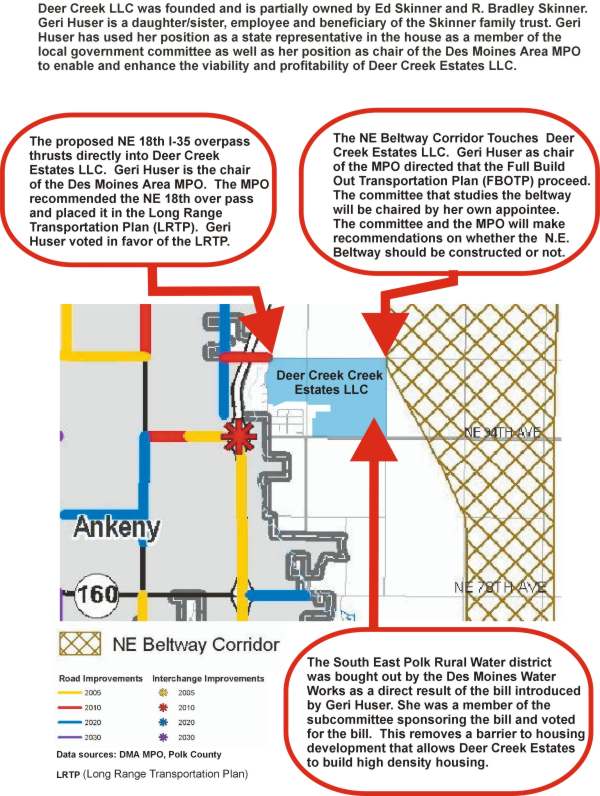|
● Deer Creek Estates LLC a land
development company was founded and is partially owned by Ed Skinner and
R. Bradley Skinner. Geri Huser is a daughter/sister, employee and
beneficiary via the Skinner family trust. Geri Huser's actions as State
Representative and as Chairperson of the Des Moines MPO have increased the
viability and monetary value of Deer Creek Estates LLC. Geri Huser
has not abstained during key votes or made officials aware of her
relationship to Deer Creek Estates when infrastructure decisions involving
Deer Creek Estates have been made.
Download
an extensive document detailing the alleged conflict of interest involving
Geri Huser.
|
|
|
The following is from the code of Iowa: Code of Iowa 68B.2A Conflicts of interest. 1. Any person who serves or is employed by the state or a political subdivision of the state shall not engage in any outside employment or activity which is in conflict with the person's official duties and responsibilities. In determining whether particular outside employment or activity creates an unacceptable conflict of interest, situations in which an unacceptable conflict shall be deemed to exist shall include, but not to be limited to, any of the following: a. The outside employment or activity involves the use of the state's or the political subdivision's time, facilities, equipment, and supplies or the use of the state or political subdivision badge, uniform, business card, or other evidences of office or employment to give the person or member of the person's immediate family an advantage or pecuniary benefit that is not available to other similarly situated members or classes of members of the general public. This paragraph does not apply to off-duty peace officers who provide private duty security or fire fighters or emergency medical care providers certified under chapter 147A who provide private duty fire safety or emergency medical services while carrying their badge or wearing their official uniform, provided that the person has secured the prior approval of the agency or political subdivision in which the person is regularly employed to engage in the activity. For purposes of this subsection, a person is not "similarly situated" merely by being or being related to a person who serves or is employed by the state or a political subdivision of the state. b. The outside employment or activity involves the receipt of, promise of, or acceptance of money or other consideration by the person, or a member of the person's immediate family, from anyone other than the state or the political subdivision for the performance of any act that the person would be required or expected to perform as a part of the person's regular duties or during the hours during which the person performs service or work for the state or political subdivision of the state. c. The outside employment or activity is subject to the official control, inspection, review, audit, or enforcement authority of the person, during the performance of the person's duties of office or employment. 2. If the outside employment or activity is employment or activity described in subsection 1, paragraph "a" or "b", the person shall immediately cease the employment or activity. If the outside employment or activity is employment or activity described in subsection 1, paragraph "c", or constitutes any other unacceptable conflict of interest, unless otherwise provided by law, the person shall take one of the following courses of action: a. Cease the outside employment or activity. b. Publicly disclose the existence of the conflict and refrain from taking any official action or performing any official duty that would detrimentally affect or create a benefit for the outside employment or activity. For purposes of this paragraph, "official action" or "official duty" includes, but is not limited to, participating in any vote, taking affirmative action to influence any vote, granting any license or permit, determining the facts or law in a contested case or rulemaking proceeding, conducting any inspection, or providing any other official service or thing that is not available generally to members of the public in order to further the interests of the outside employment or activity. 3. Unless otherwise
specifically provided the requirements of this section shall be in
addition to, and shall not supersede, any other rights or remedies
provided by law. |
* If you find any inaccuracies please notify me through the contacts menu under Ankeny Watch
|
